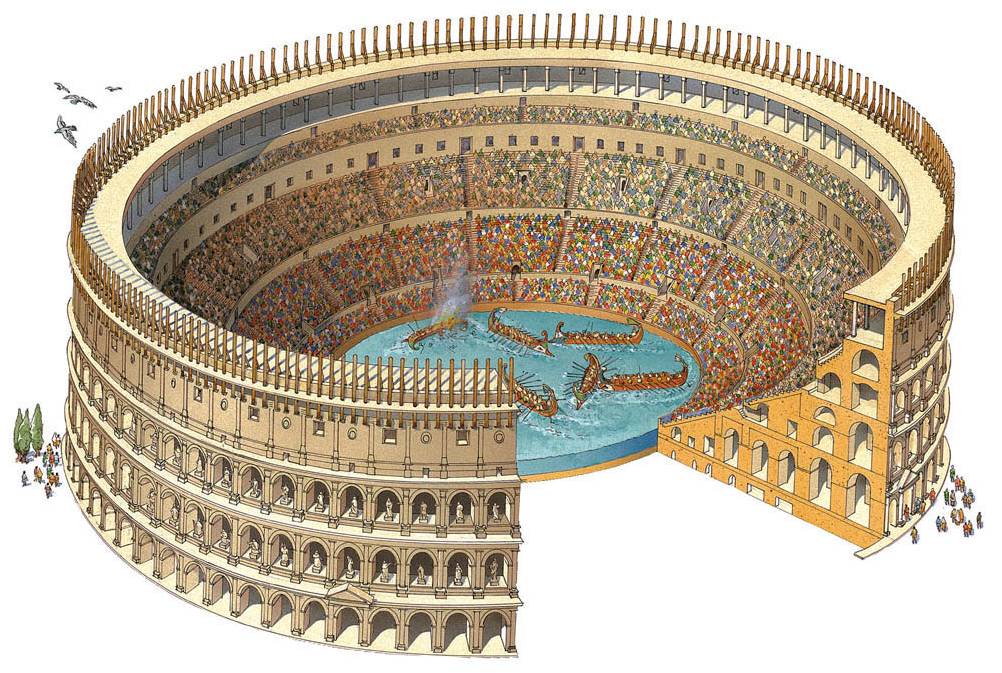Modern Day Gladiators
 The words of the Teacher, the son of David, king in Jerusalem. “Utterly pointless,” says the Teacher. “Absolutely pointless; everything is pointless.” What does a man gain from all of the work that he undertakes on earth?— Ecclesiastes 1:1–3 (ISV)
The words of the Teacher, the son of David, king in Jerusalem. “Utterly pointless,” says the Teacher. “Absolutely pointless; everything is pointless.” What does a man gain from all of the work that he undertakes on earth?— Ecclesiastes 1:1–3 (ISV)
Settling unhappily into his Super Bowl seat, high behind the end zone, Joe spots an empty seat low and on the 50-yard line. He descends to it and asks the man seated next to him why the coveted seat is unoccupied. The man says, “It’s mine. I was supposed to come with my wife, but she died. This is the first Super Bowl since 1967 we have not attended together.” Joe says: “But couldn’t you find a friend or relative to come with you today?” The man replies: “No, they’re all at the funeral.”
This story is an apocryphal story for the American national rite, the Super Bowl. Super Bowls are so integral to the American psyche they are usually denoted with Roman numerals. (This year’s game, however, is designated Super Bowl 50 because Super Bowl L looks strange and most people have no idea how to read Roman numerals beyond V and maybe X.) It is appropriate that Roman numerals are used for the game that harkens back to gladiatorial games of Ancient Rome.
Throughout its history, Christianity has intersected with sports in both conflicting and congruous ways. In the earliest Christian literature, the apostle Paul used metaphors from the world of sports to align faith with the demands of discipline and the quest for victory that orient athletic activities. Although the earliest Christian writings do not address issues related to the acceptability of sports within the faith, they create a positive attitude toward dedication and competition, which are constitutive aspects of athletic activities.
Paul and Sports
The most expansive of Paul’s sports metaphors appears in 1 Corinthians:
You know that in a race all the runners run but only one wins the prize, don’t you? You must run in such a way that you may be victorious. Everyone who enters an athletic contest practices self-control in everything. They do it to win a wreath that withers away, but we run to win a prize that never fades. That is the way I run, with a clear goal in mind. That is the way I fight, not like someone shadow boxing. No, I keep on disciplining my body, making it serve me so that after I have preached to others, I myself will not somehow be disqualified. (1 Corinthians 9:24–27 (ISV) – (see also Hebrews 12:1)
Similarly, in 1 Timothy an appreciation of pugilism appears in the urging to “fight the good fight of the faith” (6:12), and images of athletic training direct the reader to a sympathetic understanding of the value of discipline and preparation (4:7b–8). In Philippians Paul also invokes the image of the finish line in a race as a way of focusing attention on the singular goal of faith: “This one thing I do: forgetting what lies behind and straining forward to what lies ahead, I press on toward the goal for the prize of the heavenly call of God in Christ Jesus” (3:13b–14).
The apostle also likened the Christian life to that of a track-and-field runner (Acts 20:24; Rom. 9:16; Gal. 2:2; 5:7; Phil. 2:16), a wrestler (Eph. 6:12.) He noted that athletes were obliged to compete according to rules (2 Tim.2:5), and that they competed for a prize (1 Cor. 9:24–27; 1 Thess. 2:19).
In contrast to the smug self-satisfaction of the Corinthian Christians, Paul uses a vivid sports metaphor to paint the actual condition of the apostles. Displayed us, the apostles, last, is a pitiful analogy drawn from the cruelty of the Roman arena. The apostles were like gladiators fighting to the death, or like criminals thrown to the lions, made a spectacle as the grand finale to a day’s sport in a colosseum.
For it seems to me that God has put us apostles on display in last place, like men condemned to death. We have become a spectacle for the world, for angels, and for people to stare at.— 1 Corinthians 4:9 (ISV)
Since Paul used so many sports metaphors, it makes one wonder how fast Paul and Barnabas ran from the Jews of Antioch when the people did not hear the disciples’ words and the two shook the mocker’s dust from their feet and left them.
Throughout Christian history theologians and church leaders have continued to use popular sports imagery to express the challenges, processes and goals of faith. During the late 20th century, for instance, two gospel songs drew upon baseball and football for their inspiration, albeit with what many would consider a lack of propriety: “Jesus at the Home Plate” and “Drop Kick Me, Jesus, through the Goal Posts of Life.”
Although neither of these songs manifests the insight of Paul’s epistles, both rely on sports images to convey a basic Christian message.
More Important Things
While there are many illustrations in the Bible relating to sports, no sport is more important than your relationship with God. Ecclesiastes points out that “all is vanity”; everything is pointless if we are not right with God.
Continue reading here
© Copyright 2016 Koinonia House
Image Credit: Wikipedia
Related Articles